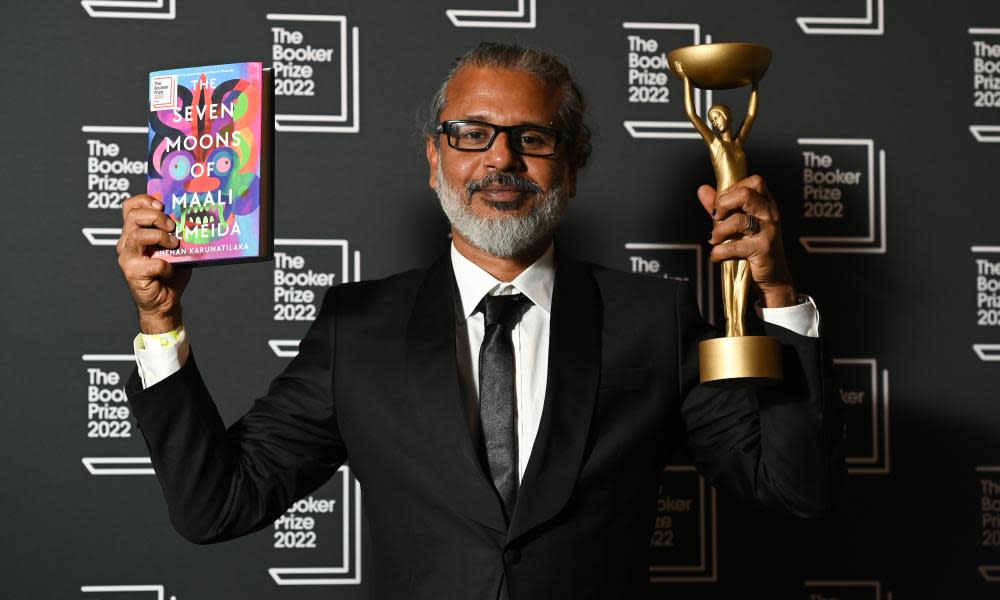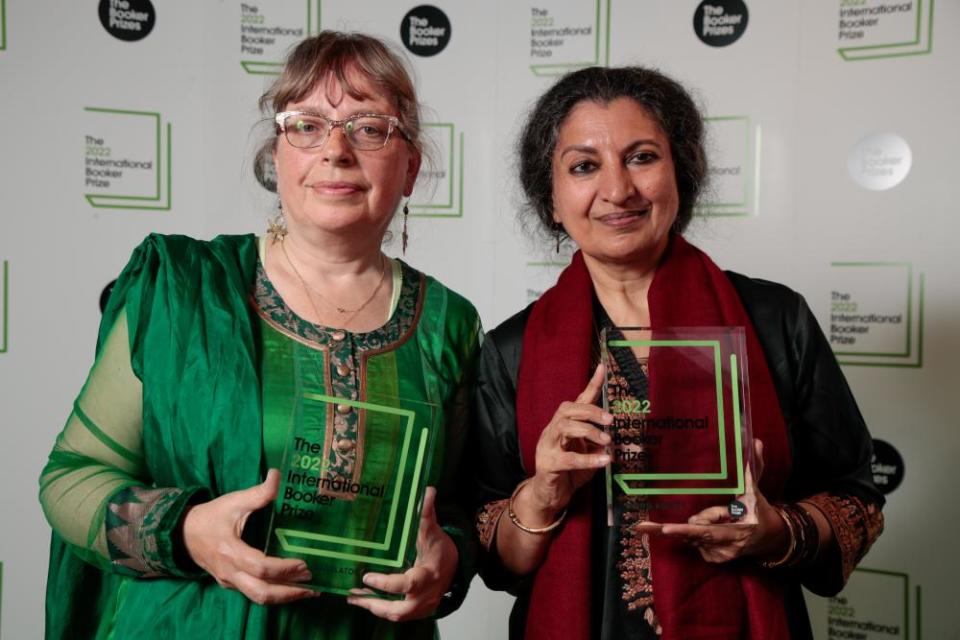What does this year’s double Booker win mean for south Asian literature?

Why isn’t more south Asian fiction published outside the subcontinent? And is the tide now turning? As this year has shown, it’s prizeworthy stuff. In October, Sri Lankan writer Shehan Karunatilaka’s The Seven Moons of Maali Almeida took home the 2022 Booker prize, with Indian writer Geetanjali Shree and her translator Daisy Rockwell winning the International Booker prize for Tomb of Sand. The latter novel, which has also recently joint-won the Warwick prize for women in translation, was translated from Hindi, and was the first south Asian book to be awarded the £50,000 translation prize. For south Asian writers to win both Bookers in the same year was unexpected indeed.
Of course, as Rockwell says, such patterns in prizes are “sometimes flukes”, and it is not as if recognition of south Asian writers has sprung from nowhere. Last year, for example, Sri Lankan Anuk Arudpragasam was shortlisted for the Booker with A Passage North. But Manasi Subramaniam, the editor and publisher of the Indian editions of Karunatilaka’s and Shree’s books, thinks what is happening now is something bigger, “a reframing of the global south in the wider literary narrative”. She clarifies that several changes over the last few decades – “diasporic writing, brave independent publishers, a steady shifting of the gaze, translators who have quietly chipped away at excavation projects to expand our collective oeuvre” – have contributed to the current moment. Still, the work is slow, and often the weight rests on the shoulders of individuals and small presses.

Founded in 2015, Tomb of Sand’s publisher Tilted Axis is a non-profit press that mainly publishes work by Asian writers. This year brought its first longlisting for the International Booker prize, with three titles on the list: Love in the Big City by Sang Young Park, translated by Anton Hur and Happy Stories, Mostly by Norman Erikson Pasaribu, translated by Tiffany Tsao; and Tomb of Sand. For some time now, small presses in the UK have been doing the heavy lifting, championing global literatures in a diversity of languages and genres. Rockwell hopes that Tilted Axis’s recent successes “will lead other publishers to reconsider their own biases and start considering more works from writers of colour and the global south”. Furthermore, she notes that “a number of translators of south Asian literatures, and their agents, have been making a concerted push towards greater recognition of the gems of translated south Asian literature beyond the subcontinent.”
Kanishka Gupta, the literary agent of all three Booker winners, Rockwell, Shree and Karunatilaka, says that even before it was shortlisted, he recalls Shree and Rockwell telling him that if there were any practising translators on the jury, “it would be hard for them to ignore a book like Tomb of Sand”. This is because of the way it plays with language, and with preconceived notions of the art and praxis of translation. And it shares more with The Seven Moons of Maali Almeida than just a Booker-winner sticker: both books tackle tough topics – partition, civil war – with refreshing humour and honesty, avoiding stereotypical ways of storytelling about these regions and their histories.
Karunatilaka may not have ever been published, let alone won prizes, had it not been for fellow literary Sri Lankans paying their successes forward. Michael Ondaatje – the only other Sri Lankan writer to win the UK’s leading award for fiction – joint-won the 1992 Booker with The English Patient. He used his prize purse to found the Gratiaen prize, an annual award for the best work of literary writing in English by a resident of Sri Lanka.
Karunatilaka’s debut novel, Chinaman, won the 2008 Gratiaen prize in manuscript form. Yet he failed to find a publisher, self-publishing it in 2010; a year later, Penguin India picked it up and Vintage then published it in the UK in 2012. Chinaman went on to win the 2012 DSC prize for south Asian literature, and, in the same year, the Commonwealth book prize. The Seven Moons of Maali Almeida was published in India under the title Chats with the Dead almost a decade later, but, once again, Karunatilaka struggled to find an international publisher. This time, he sent it to his editor friend Natania Jansz, another fellow Sri Lankan, who runs indie press Sort of Books with her husband, Mark Ellingham.
This year south Asian fiction writers in the diaspora have received recognition across the Atlantic, too, in the 2022 National Book Award. “To my knowledge, no writer of south Asian heritage has won the National Book Award to date – and yet, this year’s longlist had not one, not two, but three writers,” says Sarah Thankam Mathews, who was nominated for her buzzy debut All This Could Be Different. Mathews was joined on the longlist by Jamil Jan Kochai for The Haunting of Hajji Hotak, stories of Afghanistan and its disapora, and Fatimah Asghar for When We Were Sisters (Mathews and Kochai also made the shortlist). Mathews sees Karunatilaka’s Booker win as a global victory for south Asian writers. “Every win for any south Asian writer sends a message that our creative traditions and our stories are important, that we are here, that we have always been here.”
Booker wins in particular are significant in south Asia itself. While Gupta admires the scale and ambition of “India’s Booker”, the JCB prize for Literature, in India, “the only prizes that really make an impact on sales are both Bookers. None of the other UK or US prizes (unless it’s a Pulitzer won by an Indian) has any bearing,” he notes. Indian publishers often wait until a book travels the western prize circuits before picking it up for the Indian market. The flow of movement of literature between the east and the west is not always straightforward or unidirectional; it is messy, and manifests uneven power dynamics. Tomb of Sand “has become something of a phenomenon in India post-Booker, but it has received no awards or prizes there yet”, says Rockwell.
Will there be a domino effect of the double Booker win for south Asian writers? Is it too soon to tell? These wins are exceptional cases: it remains the case that few publishers and editors in the west read and publish writers from south Asia. On top of that, the fact that most south Asian books published in the west are English-language originals perpetuates a skewed narrative of south Asian literary culture. It undermines the countries’ complicated colonial histories, south Asia’s rich multilingual literary spaces, and exposes the asymmetrical power dynamics at play.
Publishing books is a business, and prizes bring its politics and ethics into focus. It’s always worth looking to the margins – to the work of independent presses, to translations, to underprivileged voices – and amplifying these stories and perspectives. One exceptional, extraordinary prize year cannot fix years of myopia. As Subramaniam says, “it’s taken a lot to get us here, and it’s going to take just as much, if not more, to take us further”.
What would long-overdue south Asian representation and recognition in publishing look like? Sustainable change would, I believe, mean big western publishing houses wholeheartedly and consciously embracing writing, translated or otherwise, from south Asia. It would mean more programmes such as PEN Presents, English PEN’s new award scheme to support sample translations, which recently announced its inaugural winners with a focus on the languages of India. And it would mean more presses such as Tilted Axis, doing radical, revolutionary work – tilting and changing the way in which we read the world.

 Yahoo Movies
Yahoo Movies 
